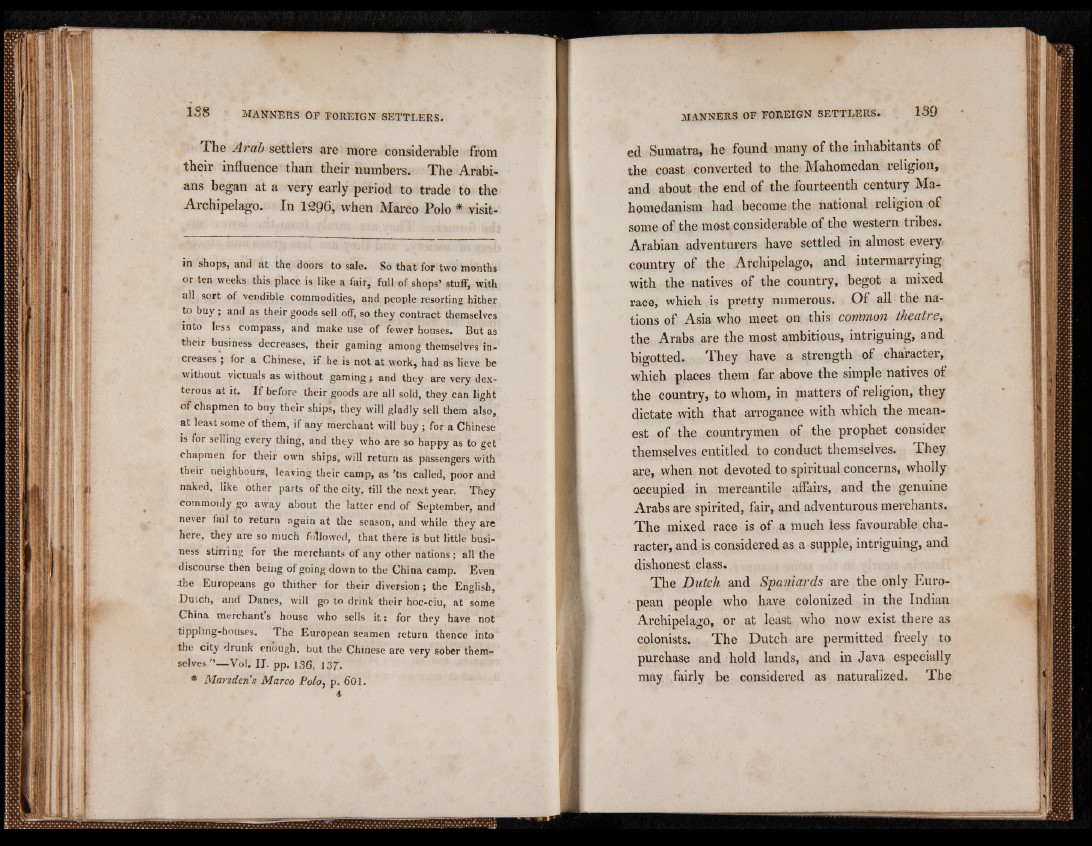
The Arab settlers are more considerable from
their influence than their numbers. The Arabians
began at a very early period to trade to the
Archipelago. In 1296, when Marco Polo * visit—
in shops, and at the doors to sale. So that for two months
or ten weeks this place is like a fair, full of shops’ stuff, with
all sort of vendible commodities, and people resorting hither
to buy ; and as their goods sell off, so they contract themselves
into less compass, and make use of fewer houses. But as
their business decreases, their gaming among themselves increases
; for a Chinese, if be is not at work, had as lieve be
without victuals as without gaming; and they are very dexterous
at it. I f before their goods are all sold, they can light
of chapmen to buy their ships, they will gladly sell them also,
at least some of them, if any merchant will b u y ; for a Chinese
is for selling every thing, and they who are so happy as to get
chapmen for their own ships, will return as passengers with
their neighbours, leaving their camp, as 'tis called, poor and
naked, like other parts of the city, till the next year. They
commonly go away about the latter end of September, and
never fail to return again at the season, and while they are
here, they are so much followed, that there is but little business
stirring for the merchants of any other nations; all the
discourse then being of going down to the China camp. Even
-the Europeans go thither for their diversion; the English, ' o y
Dutch, and Danes, will go to drink their boc-ciu, at some
China merchants house who sells its for they have not
tipphng-houses. The European seamen return thence into
the city drunk enough, but the Chinese are very sober themselves
”—Vol. II. pp. 136, 137".
* Marsdens Marco Polo, p. 601.
ed Sumatra, he found many of the inhabitants of
the coast converted to the Mahomedan religion,
and about the end of the fourteenth century Ma-
homedanism had become the national religion of
some of the most considerable of the western tribes.
Arabian adventurers have settled in almost every
country of the Archipelago, and intermarrying
with the natives of the country, begot a mixed
race, which is pretty numerous. Of all the nations
of Asia who meet on this common theatre,
the Arabs are the most ambitious, intriguing, and
bigotted. They have a strength of character,
which places them far above the simple natives of
the country, to whom, in matters of religion, they
dictate with that arrogance with which the meanest
of the countrymen of the prophet consider
themselves entitled to conduct themselves. They
are, when not devoted to spiritual concerns, wholly
occupied in mercantile affairs, and the genuine
Arabs are spirited, fair, and adventurous merchants.
The mixed race is of a much less favourable character,
and is considered as a supple, intriguing, and
dishonest class.
T]he Dutch and Spaniards are the only European
people who have colonized in the Indian
Archipelago, or at least who now exist there as
colonists. The Dutch are permitted freely to
purchase and hold lands, and in Java especially
may fairly be considered as naturalized. The